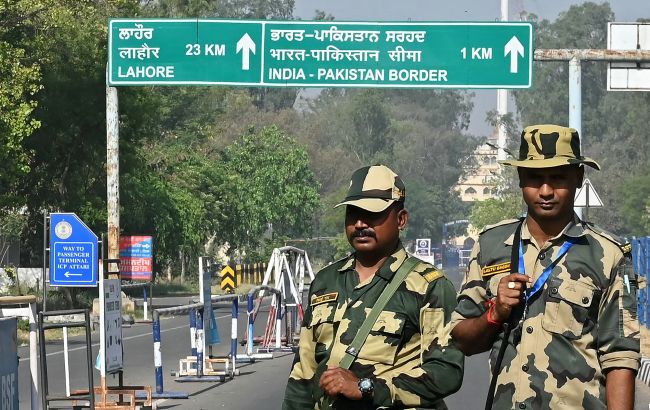India and Pakistan cancel visas and close borders after deadly Kashmir violence
 Border guards at closed India-Pakistan crossing after Kashmir attack (Photo: Getty Images)
Border guards at closed India-Pakistan crossing after Kashmir attack (Photo: Getty Images)
India and Pakistan have canceled visas for each other's citizens, closed borders, and exchanged threats after a deadly militant attack in Kashmir killed at least 26 tourists, reports AP News.
Tensions between India and Pakistan reached a new peak after gunmen killed 26 tourists at a resort in Indian-controlled Kashmir, marking the deadliest assault on civilians in the region in decades.
In response, India revoked all visas for Pakistani nationals, ordered Pakistani visitors to leave, cut the number of diplomats, and shut down the last functioning land border crossing.
India also suspended the landmark Indus Water Treaty, a water-sharing agreement that has survived two wars, raising fears of humanitarian consequences for millions in both countries.
Pakistan retaliated by closing its airspace to Indian airlines and suspending all trade with India. Pakistani officials condemned India's "belligerent measures" and warned that attempts to block river water would be seen as an "act of war."
Pakistan's Foreign Minister warned that any military move by India would be met with "tit-for-tat kinetic response." On both sides, political leaders hinted at possible military escalation.
"India will identify, track and punish every terrorist, their handlers and their backers. We will pursue them to the ends of the earth," Indian Prime Minister Narendra Modi said, as pressure mounts on his government for a strong response.
Shock and fear grip Kashmir as the region faces uncertain future
The attack, claimed by a previously unknown militant group, shocked both Indian society and residents of Kashmir, where tourists had rarely been targeted before.
Funerals for victims were held across India, while in Kashmir, businesses and schools closed amid fears for the region's fragile tourism industry.
Public protests and candlelight marches expressed outrage at the violence, which many local leaders called "unacceptable and against the ethos of Kashmir."
International leaders, including the UN Secretary-General and the US President, strongly condemned the attack, stressing that "attacks against civilians are unacceptable under any circumstances."
Ukraine's Foreign Ministry also issued a statement denouncing the violence and expressing solidarity with India.
The incident drew comparisons to the region's deadliest attack since 2000, highlighting the volatility of the long-standing conflict between the nuclear-armed rivals.
Experts warn that the surging tensions and mutual blame may leave both governments with few options beyond escalation unless the political roots of the Kashmir crisis are addressed.

